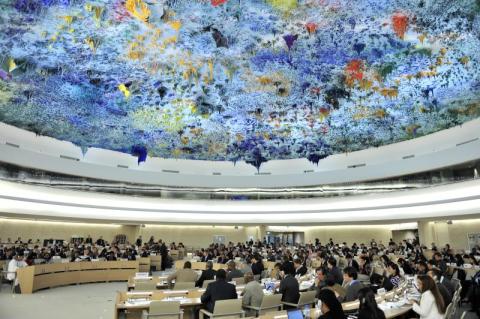
On 17 July 2023, Alkarama submitted its alternative report to Saudi Arabia's upcoming Universal Periodic Review (UPR). In the course of 2024, Saudi Arabia will be reviewed for the fourth time in the context of the Universal Periodic Review by the Human Rights Council.
The Human Rights Council periodically reviews the compliance of each of the 193 UN Member States with their human rights obligations and commitments.
On this occasion, Alkarama made its contribution by submitting its report in which it assessed the human rights situation in the State party and outlined its main areas of concern, including, inter alia, violations of freedom of association and expression, the systematic practice of arbitrary detention and the use of torture and ill-treatment.
1- Violations of freedom of expression and association
In its report, Alkarama pointed out that national legislation criminalizes peaceful dissent. Despite numerous recommendations made in the previous UPR to lift restrictions on freedom of expression and association and end persecution and reprisals, Saudi Arabia has arrested many peaceful activists and dissidents solely for peacefully exercising their rights to freedom of expression, assembly and association.
Alkarama expressed concern about the situation of human rights defenders and social media users who remain under close surveillance even abroad.
Since 2017, the number of journalists and bloggers behind bars has more than tripled. Under anti-terrorism and cybercrime laws, journalists can be prosecuted for making critical comments under the pretext of "blasphemy", "incitement to chaos", "endangering national unity" or "damaging the image and reputation of the king and the state". The expression of opinions online is monitored by "electronic brigades", which are very active on social networks to spot dissidents online, leading to their arrest and criminal prosecution followed by heavy sentences.
Alkarama recalled the case of Awad Al-Qarni, a Saudi law professor and prominent academic, who was arrested by the intelligence services (Mahabith) in 2017 during the extensive crackdown on dissident clerics, human rights defenders, journalists and businessmen.
Accused of using social networks (Twitter and WhatsApp) to disseminate information interpreted as "hostile" to the Saudi royal authorities, Al Qarni has been arbitrarily detained since his arrest. Today, he faces the death penalty solely for peacefully expressing his dissenting views on social media.
2- The widespread and systematic practice of arbitrary detention
The practice of arbitrary detention remains systematic in the country. Again, the authorities show no reluctance to use the anti-terrorism law that criminalizes peaceful criticism. Human rights defenders and peaceful dissidents are then arbitrarily convicted and detained on the basis of this law.
The case of Mr. Mohammed Al-Qahtani is a clear illustration of the abuse of the anti-terrorism law. Among the founders of the Saudi Civil and Political Rights Association (ACPRA), which was dissolved in 2013, he was sentenced to 10 years in prison on the pretext of "providing false information to outside sources," including UN human rights mechanisms.
Recently, Alkarama had addressed the UN Special Rapporteur on torture to express its concerns about his situation after his transfer to a section of the prison reserved for detainees suffering from psychological disorders.
In its report Alkarama also analyzed the "Munasaha Program" launched in 2007. Presented by the Saudi authorities as a program for the reintegration and rehabilitation of "terrorists" who have served their entire prison sentence, these centers offer, according to the government, therapy and treatment "consisting of psychological, social and religious sessions aimed at eradicating terrorist and extremist ideologies". It is thus up to the Ministry of the Interior to determine whether or not these people can be released at the end of the "programme" imposed.
In practice, these centres allow many individuals to be arbitrarily detained after they have served their sentences, without judicial review, and on the pretext that they may continue to pose a "threat" in the future because they may continue to hold dissenting views after their release. Munasaha centers are actually designed to coerce political prisoners to express absolute loyalty to royal authority in exchange for their release.
3- The constant use of torture and ill-treatment
Since the last UPR, numerous cases of torture and ill-treatment have been documented by Alkarama, demonstrating a systematic use of such practices to extract confessions. Such practices remain systematic, particularly in the premises of the Bureau of Public Investigation and Prosecutions (BIPP) and the intelligence services (Mabahith), the latter being responsible for investigating "security-related" crimes.
Although Saudi Arabia accepted recommendations to ensure that its legal framework related to detention will provide sufficient safeguards against torture and ill-treatment in detention, no such safeguards have been implemented since.
Alkarama recalled that Saudi law has still not criminalized torture and therefore does not guarantee its absolute prohibition. Safeguards such as habeas corpus and the exclusion of statements obtained under torture do not exist in domestic legislation.
Documented torture and ill-treatment include, inter alia, electric shocks, severe beatings and flogging, hanging by the hands and feet, beatings on the soles of the feet ("falaqa"), deprivation of sleep, food and light, exposure to extreme temperatures and prolonged solitary confinement.
Finally, Alkarama indicated that the absence of independent monitoring and complaint mechanisms in places of detention, under the authority of the executive, also contributes to impunity for perpetrators of acts of torture.
Alkarama, which has issued numerous recommendations concerning the various violations and shortcomings that it may have raised in its contribution, has called on Saudi Arabia to:
Amend the Cybercriminal Law and the Anti-Terrorism Law to repeal provisions that criminalize the peaceful exercise of the rights to freedom of expression, association and peaceful assembly;
End the practice of arbitrary and indefinite detention in Munasaha centres and release all those detained beyond their sentences in these centres;
Define and criminalize torture in accordance with the UN Convention against Torture;
Ensure that all allegations of torture and ill-treatment are effectively investigated and prosecuted.
